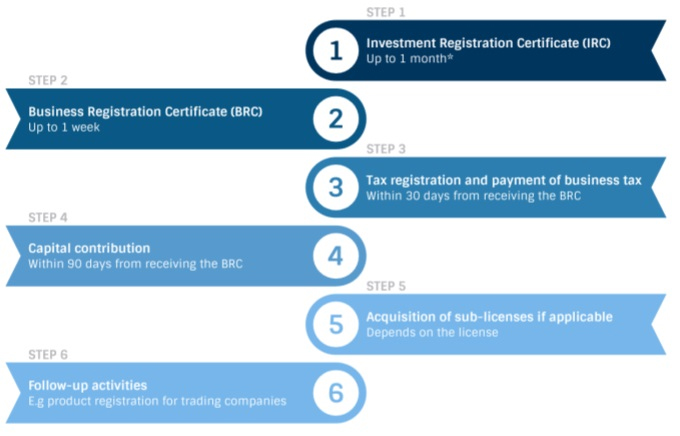Vietnam Incorporation Services For Off-Shore Company

Vietnam, the third largest market in Southeast Asia, provides countless opportunities to foreign investors. What are the fundamental things you need to know about company registration in Vietnam?
The two most common legal entity types to set up in Vietnam are a limited liability company (LLC) and a joint-stock company (JSC).
An LLC can have 1 to 50 members who are also known as founders or owners.
The alternative to an LLC is to set up a joint-stock company (JSC), also known as a shareholding company. A JSC has 3 to an unlimited number of shareholders.
The first step of your company registration in Vietnam is to decide what will be your business activities to determine the allowed foreign ownership of the company.
Vietnam allows 100% foreign ownership in most sectors.
For example, trading, IT, manufacturing education sectors welcome foreign investment.
Some business lines such as advertising and tourism, however, require a Vietnamese joint venture partner.
After you know the activities, Sage can advise on which is the best business line for your company. Also, whether it is possible to set up your company as 100% foreign-owned or you need to establish a joint venture in Vietnam.
Foreign ownership regulations in Vietnam
In Vietnam, the World Trade Organization (WTO) agreements regulate the allowed foreign ownership in different business lines.
However, if there are no WTO agreements nor local laws regulating foreign ownership in that business line, you will need a Ministry-level approval to set up your company.
In general, there is no minimum capital requirement in Vietnam. However, the capital you contribute should reflect the activities of the company.
Receiving approval from the Department of Planning and Investment depends on whether your minimum capital contribution complies with your actual planned expenses or not.
From our experience, it is possible to set up a service company with a minimum capital of USD 3,000. For manufacturing, the funds should exceed the cost of machinery.
The most common amount of minimum capital in Vietnam is USD 10,000. This amount is relatively small compared to other similar markets. In Indonesia, for example, the minimum amount of paid-up capital is ~USD 175,000.
There are also some business lines in Vietnam that have a minimum capital requirement. Some of these business lines are:
- Language centers
- Vocational schools
- Real estate companies
To incorporate a company in Vietnam, you will need a registered address for your business.
Service-based businesses can use a virtual office for the registration purposes. Manufacturing companies or companies which require a retail or business space for conducting their activities, on the other hand, need a physical business location in Vietnam.
In some cases, the Department of Planning and Investment will check it before the incorporation. It is sufficient to present a memorandum of understanding (MOU) or an offer letter stating that the founder will use the premises for conducting the company’s activities once it is set up.
All companies in Vietnam require at least one resident director. The appointed director doesn’t have to have residency status at the time of incorporation. However, they need a residential address in Vietnam.
All landlords must register foreign nationals leasing their premises with the police. If the director is also a founder, he or she will not require a work permit. If the director is not a founder and is a foreign national, he or she will need a work permit in Vietnam.

1. Investment license
The first step of any foreign-owned company registration in Vietnam is to obtain an Investment Registration Certificate from the Department of Planning and Investment (DPI).
In general, it takes up to one month to receive it.
However, if your business line does not fall under any WTO commitments or no local laws regulate foreign investment in that business line, the timeline will be significantly longer since the DPI will have to ask for a Ministry-level approval.
2. Business registration certificate
The second step is to acquire a Business Registration Certificate (BRC), also known as the Enterprise Registration Certificate (ERC).
Generally, it takes up to one week to receive a BRC/ERC.
3. Tax registration and payment of the business license tax
The next thing you need to do after obtaining the Business Registration Certificate is to complete tax registration at the local tax department.
In Vietnam, businesses also need to pay an annual business license tax which is ~USD 90.
Keep in mind that you have 30 days from receiving the BRC/ERC to complete the tax registration and pay the business license tax.
4. Capital contribution
Once you have received the Business Registration Certificate,/Enterprise Registration Certificate you have 90 days to make the initial capital contribution.
5 Apply for sub-licenses, if applicable
Some business lines such as manufacturing, lodging, and trading also require additional licenses which will extend the process.
6. Follow-up activities
The last step of company registration in Vietnam after other permits are in place is to complete the follow-up activities.
For example, trading companies may need to complete product registration which can take from 10 days to 4 months.
